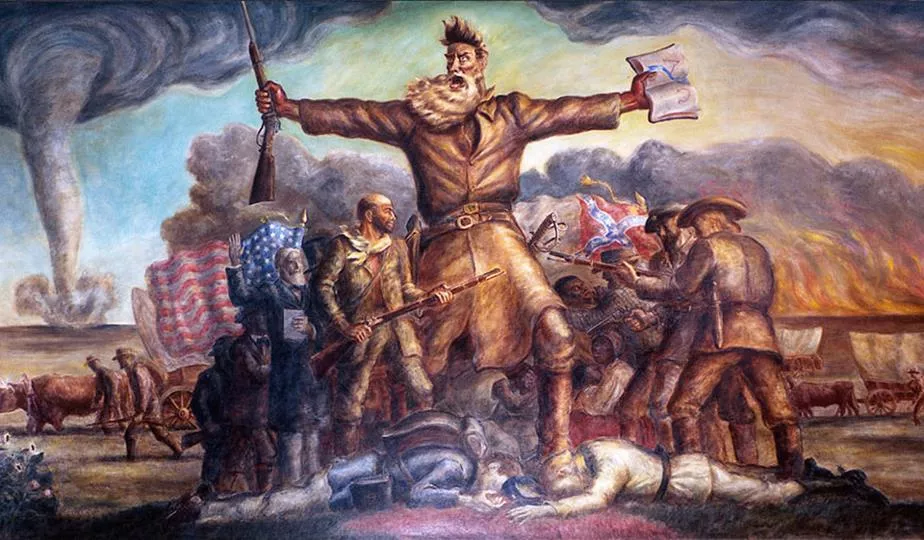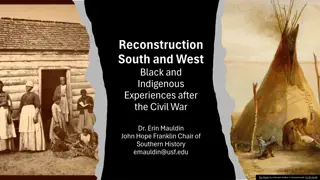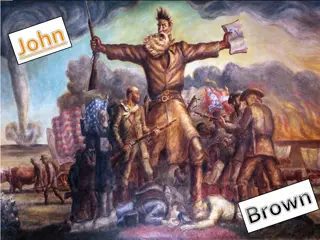John Brown's Role in Escalating Tensions Towards the Civil War
Explore John Brown's pivotal role in the lead-up to the Civil War through his radical abolitionist actions, including the violent events in Bleeding Kansas and his infamous raid on Harper's Ferry. Brown's staunch anti-slavery stance and militant tactics further polarized the nation on the issue of slavery, ultimately contributing to the eruption of the Civil War. Learn about his relentless efforts to incite a slave rebellion and the impact of his actions on the course of American history.
Download Presentation

Please find below an Image/Link to download the presentation.
The content on the website is provided AS IS for your information and personal use only. It may not be sold, licensed, or shared on other websites without obtaining consent from the author. Download presentation by click this link. If you encounter any issues during the download, it is possible that the publisher has removed the file from their server.
E N D
Presentation Transcript
Causes of the Civil War Causes of the Civil War John Brown Rebellion
Where are we in the path to Civil War? The 1854 Kansas-Nebraska Act allowed for popular sovereignty in all the newly organized Kansas and Nebraska Territories, leading to violence known as Bleeding Kansas. The Dred Scott Decision handed down by the United States Supreme Court reaffirmed that slaves were considered property and had no personal or civil rights. It also declared the territorial limits on slavery as defined by the Missouri Compromise were unconstitutional. We start this history in 1859, but first, let s learn a little bit about John We start this history in 1859, but first, let s learn a little bit about John Brown Brown
Who was John Brown? Born in 1800 in Connecticut Developed a deep hatred for slavery at an early age when he stayed with a family in Michigan and witnessed a slave being beaten. Started a school to help educate young Black people. Became a radical abolitionist Had 12 Children
Bleeding Kansas Violence erupted in Kansas following the Kansas-Nebraska Act. Abolitionists and Pro-slavery groups moved into the state to try to sway the vote on whether the state would allow slavery. Violence erupted, people were murdered, and the town of Lawrence, Kansas an abolitionist stronghold, was burned to the ground.
Pottawatomie To avenge the murder of five abolitionists in Kansas, Brown, and five of his sons traveled to Kansas, where they brutally murdered five slavery advocates on May 24, 1856. Brown and his sons were able to escape back to Connecticut, where they were hailed as heroes by many.
Planning for a Slave Rebellion When Brown returned east, he formulated a plan to free slaves by force. His plan was supported by wealthy abolitionists It included a refuge for runaway slaves in the mountains of Virginia. He planned to seize the federal arsenal at Harper s Ferry, Virginia. He believed this would inspire slaves to rebel against their owners.
John Browns Rebellion On October 16, 1859, Brown, his sons, and other loyal supporters easily took the town of Harper s Ferry and occupied the arsenal. Once inside the arsenal, the group took defensive positions and failed to launch any further offensives. The town s militia and U.S. Marines under Robert E. Lee surrounded the arsenal and easily defeated the men inside. Two of Brown s sons were killed in the raid.
John Browns Rebellion Brown was tried and convicted of murder and treason. He was hanged on December 2, 1859. Among his last words were: I John Brown am now quite certain that the crimes of this guilty, land: will never be purged away; but with Blood. I had as I now think: vainly flattered myself that without very much bloodshed; it might be done.
Effect of the John Brown Rebellion Relations between the North and South deteriorated further Many southerners believed the John Brown Rebellion was sanctioned by the U.S. Government in an attempt to free the slaves. Because no slaves had volunteered to help in the rebellion, Southern slaveholders took this to mean that slaves were content in their condition.






![❤[PDF]⚡ Civil War Talks: Further Reminiscences of George S. Bernard and His Fel](/thumb/20551/pdf-civil-war-talks-further-reminiscences-of-george-s-bernard-and-his-fel.jpg)




















